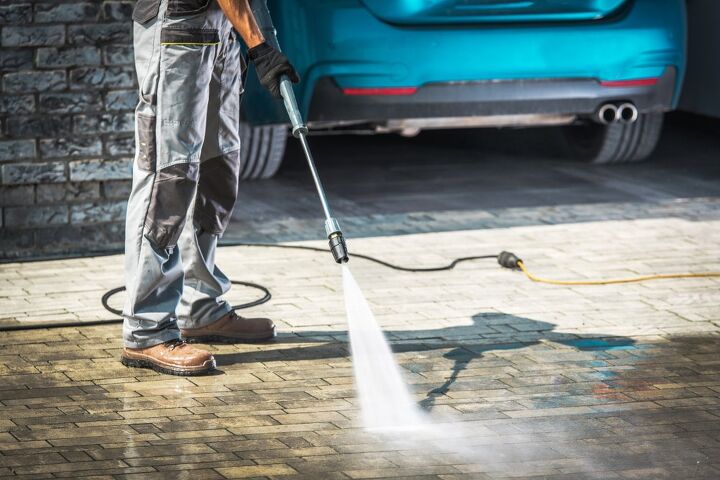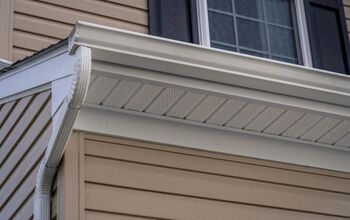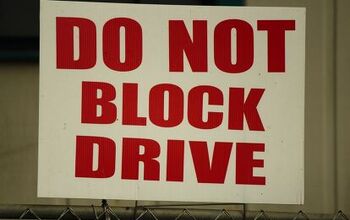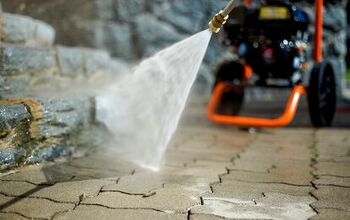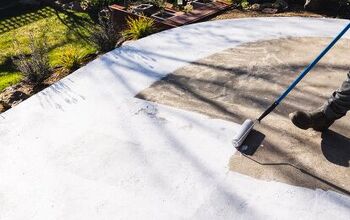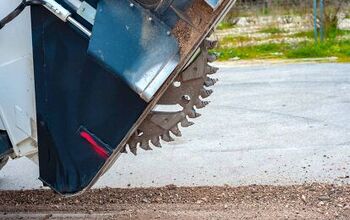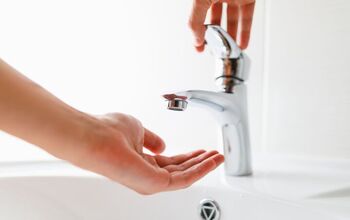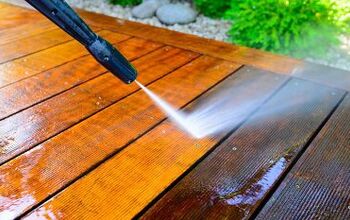Is Pressure Washing A Driveway Illegal? (Find Out Now!)

As you read guides about how to maintain your driveway, one of the steps is to pressure wash the surface. You may also be advised to use a degreaser. While this all sounds well and good, the US Environmental Protection Agency (EPA) has another opinion on the matter.
Pressure washing a driveway is not illegal. Under the Federal Clean Water Act of 1972, though, it is illegal to dispose of polluted wastewater into a storm sewer system. This includes storm water drains along city streets. Therefore, pressure washing your driving is not the issue. It’s the runoff water. Take measures to prevent the runoff from leaving your property.
Let’s take a closer look at the Clean Water Act of 1972 and steps to take to legally pressure wash your driveway.
Do You Need Powerwashing Services?
Get free, zero-commitment quotes from pro contractors near you.

Is Pressure Washing a Driveway Illegal?
Two sets of laws apply to pressure washing your driveway – the clean Water Act of 1972 and local water usage ordinances. The act of pressure washing alone is not illegal. You may, though, inadvertently violate federal, state, county, and city laws.
What is the Clean Water Act of 1972?
The Clean Water Act of 1972 was introduced into law to protect water in the United State from pollution. It also outlines quality standards for surface water. The law covers every type of public water in the country.
How Does the Clean Water Act of 1972 Apply to Pressure Washing?
Disposing of polluted wastewater into the waters of the United States is illegal under the Clean Water Act of 1972. The law applies to polluted runoff water that drains into a storm drain system.
If the runoff from pressure washing your driveway reaches a storm drain, you are violating the Clean Water Act. This includes runoff that flows into a public street and then into a storm drain.
Pressure Washing a Driveway and Water Pollution
Pressure washing a driveway removes oils, chemicals, and dirt from the surface. You may also use chemical degreasers to clean the driveway. The substances collect in the runoff of pressure washing. As a result, the water is considered polluted.
Who is Responsible for the Wastewater Runoff?
Here’s the most alarming part of the Clean Water Act of 1972. The property owner is responsible for the runoff from pressure washing a driveway. Even if you hire someone to do the job, you are the one who faces fines.
How Much are Fines for Pressure Washing a Driveway?
Fines under the Clean Water Act of 1972 are pretty stiff. The same fines apply to private citizens and public entities. You could face a fine of up to $50,000 per day. In 2012 alone, the EPA collected a total of $252 million from private property owners for violations of the Clean Water Act. That’s nearly double the amount of the previous year.
What About Water Usage for Pressure Washing a Driveway?
Water usage laws also need to be considered when you pressure wash your driveway. Most states, counties, and cities have restrictions on how much water a resident can use per month. Your locality may also have restrictions on the time of day that you can use water. Check with your local government to learn more about water usage laws in your area.
How to Pressure Wash Your Driveway Legally
So, should you give up on pressure washing your driveway? Not necessarily. The key is preventing the polluted runoff from leaving your property. If you have a fairly level property, this may not be too difficult. If your driveway slopes towards a public road, you need to take some extra steps.
Wet Vacs
Make pressure washing your driveway a two-person job. Have someone follow closely as you use the pressure washer. Clean up all the runoff as you slowly work along your driveway.
Berming
Berming is another technique that helps to keep polluted runoff on your property. The idea is to use materials that stop the runoff before it reaches the street. Under the Clean Water Act, it is acceptable for polluted water to pool on your property and evaporate. You can find spill containment materials at your local hardware or home improvement store. Just make sure that the runoff stays completely on your property.
Eco-Friendly Pressure Wash Driveway Cleaner
You can clean your driveway with eco-friendly products, but you still have to consider what is in the runoff. An alternative is to use a waterless product that contains bacteria. The bacteria in these products love petroleum products, such as engine oil. These products should not be used on asphalt because asphalt is a petroleum-based material.
What to Look for in a Professional Pressure Washing Company
With all the legal implications of pressure washing your driveway, it is a job that is best left to professionals. The job should not be left to just anyone who has a pressure washer. You are responsible for the polluted runoff and potential fines. Here are some tips.
- Licensed and experienced with eco-friendly driveway pressure washing
- Compliance with EPA regulations
- Good reputation in the community
- Aware of local laws regarding water use
How Much Does Pressure Washing a Driveway Cost?
On average, having a reputable company pressure wash your driveway v costs $100 to $500, a fraction of the fines that you will avoid. If you have the company clean your sidewalks and other paved areas, it may add $50 to $100 to the job.
How Long Does It Take to Pressure Wash a Driveway?
Professional pressure washing for a driveway takes about 2 hours. It may take longer if you have some tough stains or moss on the surface of the driveway.
Is Pressure Washing Bad for Driveways?
Pressure washing a driveway the wrong way certainly will cause some damage. Most damage is caused by the water pressure being too high. Ideally, the pressure should be between 1,300 psi and 2,300 psi. The exception is when you are cleaning a stubborn stain that may require a slightly higher pressure of around 3,000 psi.
Do You Need Powerwashing Services?
Get free, zero-commitment quotes from pro contractors near you.

Related Questions
How do I clean a gravel driveway?
The quickest way to clean a gravel driveway is with an ordinary garden hose. Remove any stained gravel.
Conclusion
Pressure washing your driveway is legal, but polluted runoff entering public waters is illegal under the Clean Water Act of 1972. Taking steps to keep the runoff on your property protects you from some very hefty fines.
Related Guides

Jennifer L. Eggerton loves being hands-on, whether it's with a home DIY project, making repairs, re-decorating a room, or keeping life organized. She enjoys helping people by sharing her knowledge, insights, and experiences, as well as her lessons learned. In addition to her work as a writer, Jennifer is a Jeep® overlander, self-published author, and nature photographer who loves being outdoors.
More by Jennifer Eggerton



